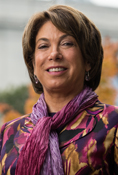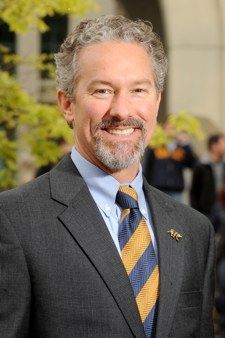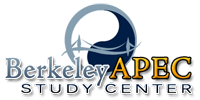Publications
|
|
Vinod K. Aggarwal | |
|---|---|
| Born | November 26, 1953 (age 70) Seattle, Washington, U.S. |
| Academic career | |
| Field | International political economy |
| Alma mater | Stanford University (Ph.D.) Stanford University (M.A.) University of Michigan (B.A.) |
| Contributions | Nested Institutional Design International Trade Regimes |
Vinod K. Aggarwal (born November 26, 1953) is Distinguished Professor and holds the Alann P. Bedford Endowed Chair of Asian Studies in the Travers Department of Political Science. He is an Affiliated Professor in the Haas School of Business, and directs the Berkeley APEC Study Center (BASC). [1] He is a visiting professor at INSEAD's Asia campus, [2] a blogger for the Harvard Business Review , [3] and has contributed to the New York Times . [4] He also serves as Editor-in-Chief of the journal Business and Politics. [5] Aggarwal is a frequent commentator and author about issues related to international political economy. He has appeared on the Korean television show Great Minds in 2021 and in 2023-24. [6] In addition, he appears regularly on American television. [7]
In 2006, Aggarwal described Washington's selective trade policies as undermining the creation of an Asia-Pacific zone. [8] He forecast that the mounting U.S. trade deficit with China would lead to failure in efforts to convert APEC into a Free Trade Area of the Pacific and said it would be "dead on arrival in Congress for the foreseeable future." [8] Later, during the 2009 global recession of world markets, Aggarwal was a prominent critic of the Fortress Asia theory which speculated that East Asian countries such as China and Japan would align to become a protectionist trade bloc averse to Western imports. [9] He has recently focused on technology conflict between the U.S. and China, arguing recently that President Biden’s efforts pursue high technology industrial policy would face serious domestic political problems. [10]
Born in Seattle, Washington, Aggarwal received his bachelor's degree in both political science and psychology from the University of Michigan in 1975, and his M.A in political science and Ph.D. in international political economy from Stanford University. [11] Prior to joining the faculty at UC Berkeley in 1980, he was a Research Fellow at the Brookings Institution, an American think-tank based in Washington, D.C. [11]
Aggarwal has been influential in the fields of U.S. trade policy, corporate strategy, international trade institutions, globalization, international debt rescheduling, international political economy, and international relations. His research expertise includes the international politics of trade, international finance, comparative public policy, rational choice, and bargaining theory. Frequently, he has been sought out in these areas by the private and public sector. [12]
He has worked with a number of Fortune 500 corporations such as Cisco, Hewlett-Packard, and Qualcomm, as well as other companies including Herman Miller, Italcementi, ARCO, and Nestle. Aggarwal was named Chief Economist for the global growth consulting firm Frost and Sullivan. [13] In the public sector, Aggarwal has consulted with the U.S. Department of Commerce, World Trade Organization, Organisation for Economic Co-operation and Development, the Group of Thirty (G30), IFAD, the International Labour Organization, ASEAN, and the World Bank.
In November 2008, Dr. Aggarwal addressed the APEC CEO Summit in Lima, Peru. That same year, he was an Abe Fellow with the Japan Foundation for 2008–2009. He is a fellow with the Center for Globalisation Research at the University of London, a member of the Council on Foreign Relations, and a founding member of the United States Asia Pacific Council. In 2003–2004, Aggarwal was a Fellow at the Woodrow Wilson Center in which he researched the pursuit of multiple modes of trade liberalization on the stability of the world trading system. [14] He regularly teaches undergraduate and graduate courses on international political economy, international relations, and business and public policy. Aggarwal was the recipient of the Cheit Outstanding Teaching Award from the Haas School of Business for Ph.D. teaching in 1997. In 2003 he was first runner-up [15] for the Cheit Award for MBA teaching and won in 2005 first place. [16]
|
|

Asia-Pacific Economic Cooperation is an inter-governmental forum for 21 member economies in the Pacific Rim that promotes free trade throughout the Asia-Pacific region. Following the success of ASEAN's series of post-ministerial conferences launched in the mid-1980s, APEC started in 1989, in response to the growing interdependence of Asia-Pacific economies and the advent of regional trade blocs in other parts of the world; it aimed to establish new markets for agricultural products and raw materials beyond Europe. Headquartered in Singapore, APEC is recognized as one of the highest-level multilateral blocs and oldest forums in the Asia-Pacific region, and exerts significant global influence.
The Walter A. Haas School of Business is the business school of the University of California, Berkeley, a public research university in Berkeley, California. It was the first business school at a public university in the United States.

Laura D'Andrea Tyson is an American economist and university administrator who is currently a Distinguished Professor of the Graduate School at the Haas School of Business of the University of California, Berkeley and a senior fellow at the Berggruen Institute. She served as the 16th Chair of the White House Council of Economic Advisers from 1993 to 1995 and 2nd Director of the National Economic Council from 1995 to 1996 under President Bill Clinton. Tyson was the first woman to hold each of those posts. She remains the only person to have served in both posts.

Marcos Prado Troyjo is a Brazilian political economist, entrepreneur, social scientist, diplomat and writer. He is currently a Transformational Leadership Fellow at the University of Oxford’s Blavatnik School of Government and a Distinguished Fellow at INSEAD’s Hoffmann Global Institute for Business and Society.
Robert Gilpin was an American political scientist. He was Professor of Politics and International Affairs at the Woodrow Wilson School of Public and International Affairs at Princeton University where he held the Eisenhower professorship.

John Gerard Ruggie was the Berthold Beitz Research Professor in Human Rights and International Affairs at Harvard Kennedy School at Harvard University and an affiliated professor in international legal studies at Harvard Law School.
The Pacific Trade and Development Conference (PAFTAD) is an informal private academic conference series that, since its origins in 1968, has developed into a driving force behind the development of thought on Pacific trade and development issues and important economic policy questions facing the region.

David John Teece is a New Zealand-born US-based organizational economist and the Professor in Global Business and director of the Tusher Center for the Management of Intellectual Capital at the Walter A. Haas School of Business at the University of California, Berkeley.
David Vogel is the Soloman P. Lee Distinguished Professor in Business Ethics at the University of California, Berkeley. He is a member of both the Political Science Department and the Haas School of Business, and is Editor of the California Management Review. He was the Jean Monnet Chair, European University Institute, in 1994 and the BP Chair in Transatlantic Relations, there in 2000. At INSEAD he was the Novartis Professor of Management and the Environment in 2000-2001 and the Shell Fellowship in Business and the Environment in 2002.
John Zysman is a professor of Political Science at the University of California, Berkeley and co-founder of the Berkeley Roundtable on the International Economy (BRIE). Professor Zysman received his B.A at Harvard and his Ph.D. at MIT. He has written extensively on European and Japanese policy and corporate strategy; his interests also include comparative politics, Western European politics, political economy and energy policy.

Richard Kent Lyons was the 14th Dean of the Haas School of Business, University of California, Berkeley, until 2018. In 2020 he became UC Berkeley's first Chief Innovation and Entrepreneurship Officer.
The University of California, Berkeley, contains many research centers and laboratories.

Teck-Hua Ho is the fifth president of the Nanyang Technological University, Singapore (NTU). He is also a Distinguished University Professor at NTU Singapore. Prior to joining NTU, he was the senior deputy president and provost at the National University of Singapore (NUS), and the William Halford Jr. Family Professor of Marketing at the Haas School of Business. He is also the founding executive chairman of AI Singapore, a national research and development programme.

Jean-Pierre Lehmann was a Swiss economist who was professor of international political economy at IMD and the founding director of The Evian Group at IMD. In August 2011, he was appointed senior fellow at the Fung Global Institute (FGI), a think-tank producing innovative thinking and research on global issues from Asian perspectives.

The Berkeley APEC Study Center (BASC) is a research center at the University of California, Berkeley. Created in 1996 in response to an initiative by U.S. President Bill Clinton, the center undertakes research, disseminates information and facilitates discussion on APEC-related issues involving political, economic and business trends in the Asia-Pacific region.
The Summer Palace Dialogue (SPD) is an economic forum which brings together economists from both China and the United States to discuss economic cooperation between the two largest economies in the world. SPD is co-hosted by Chinese Economists 50 Forum and the Columbia Global Centers East Asia, and was formerly co-hosted by the Brookings Institution. It was founded in 2009 by former Vice Chairman of the Joint Chiefs of Staff and current Chairman of AEA Investors Admiral Bill Owens and Vice Minister Liu He of the Chinese Central Leading Group on Financial and Economic Affairs. The forum extends for two days. Participants spend the first day in private discussions and then convene a half-day public session to summarize their observations, analyses, and conclusions with the press and a broader audience. The Summer Palace Dialogue is scheduled annually in mid-September in Beijing, right before the Summer World Economic Forum in Dalian. The third annual Summer Palace Dialogue was held on September 12–13, 2011.
Alexander Ebner is a German social scientist and Professor of Social Economics, esp. Economic Sociology and Political Economy at the Goethe University Frankfurt. His main research fields are Entrepreneurship and Innovation, Governance and Public Policy, Regional Development, and the History of Economics.
Shang-Jin Wei is the N. T. Wang Professor of Chinese Business and Economy and Professor of Finance and Economics at Columbia Business School. At Columbia University, Wei is also affiliated with the School of International and Public Affairs and the Weatherhead East Asian Institute. His research covers international finance, trade, macroeconomics, and China, and he writes and speaks frequently in the area of U.S.-China economic integration and other international finance and trade issues.
Catherine D. Wolfram is an American micro-economist, academic and researcher. Catherine Wolfram was named in March 2021 as the United States Department of the Treasury Deputy Assistant Secretary for Climate and Energy Economics She is the Cora Jane Flood Professor of Business Administration and associate dean for academic affairs at the Haas School of Business at University of California, Berkeley where she also serves as a faculty director of The E2e Project and as scientific director for energy and the environment at Center for Effective Global Action. She also directs the National Bureau of Economic Research's Environment and Energy Economics Program.